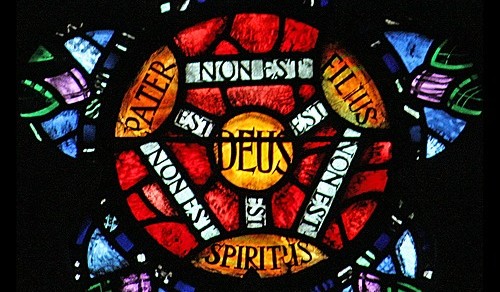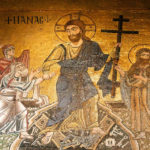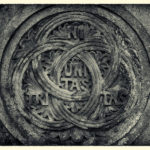We run our website the way we wished the whole internet worked: we provide high quality original content with no ads. We are funded solely by your direct support. Please consider supporting this project.

Does the Doctrine of the Trinity Matter?
Jesus reveals the greatest, most beautiful, and mysterious aspect of God when he, despite being himself God Incarnate, relates to God as his “Father” and refers to God as “the Holy Spirit.” There is, of course, only one God (1 Cor 8:6). Yet Jesus reveals that God somehow exists as Father, Son and Holy Spirit. We find God’s threefold personality revealed throughout the New Testament (e.g. 2 Cor 13:14, Matt 28:19, 1 Cor 12:4-6). It’s not just that God plays three “roles,” as some have taught. Rather, the New Testament reveals that God eternally exists as three distinct divine Persons. God is, in some sense, a loving divine community.
Throughout church history the threefold nature of God has been referred to as “the Trinity.” The word “Trinity” isn’t used in Scripture, but it’s a convenient way to summarize that New Testament’s teaching that God is Father, Son and Holy Spirit.
As with the Incarnation, it’s impossible for us to understand fully how this can be. The best we can do is come up with analogies.
For example, some have suggested the Trinity is mirrored in the threefold nature of the human psyche. This mental exercise illustrates this. Ask yourself: “When I think, who is talking and who is listening?” Notice that, in the very act of thinking, you’re manifesting a sort of plurality in your own mind. And notice that this plurality includes a relationship with yourself. You may love yourself (and thus approve of what you’re saying to yourself) or hate yourself (and thus disapprove of what you’re saying to yourself), but either way, you clearly have a relationship with yourself. So, the very act of thinking reveals that we are comprised of a self, a self-image and a relationship between the two. This plurality-amidst-unity is something like the Trinity.
An even better analogy is to imagine three people who are fully submitted to one another and are perfectly united in love and purpose. While each person in this perfect loving community would retain their distinct personhood, the heart and mind of each person would be completely surrendered to the other two. In a very real sense, therefore, this perfect community would experience, think and act as a single agent. This plurality-amidst-unity is again something like the way God is, according to the New Testament.
The revelation that God is an eternal, loving, divine community is the most foundational teaching of the Bible, for it reveals that God is, in his very eternal nature, perfect love. God is love (1 Jn 4:16). Love isn’t merely something God does; perfect love is what God eternally is.
It’s impossible to believe that “God is love” unless you conceive of God as an eternal community, for love is only possible between personal beings. If God existed alone by himself prior to the creation of the world, as Judaism and Islam teach, God could not be eternally loving within himself. God would need to create other personal agents in order to have someone to love. For Judaism and Islam, love can only be something God does, not the essence of who he eternally is. Among all the world religions, Christianity is the only one that presents a God whose very essence is love.
Since Jesus is the definitive revelation of God, we have to look to him to discover what God’s love is like—which is to say, to discover what God himself is like (1 Jn 3:16). And what we find when we do this is that the love that characterizes God’s essence is unfathomably beautiful and incomprehensibly self-sacrificial. Think about it. God crossed an infinite distance and paid the highest price imaginable to rescue a rebellious race of people who wanted nothing to do with him. In Jesus, the One who created all that is and who holds every molecule in existence (Heb 1:2) became a human being and died a hellish death out of love for a race of people who couldn’t have deserved it less!
This is the kind of love God is. The shockingly humble, other-oriented, submissive love that God expresses toward us while we were yet sinners (Rom 5:8) reflects the perfect, other-oriented love that God eternally is as Father, Son and Holy Spirit throughout eternity. This is antithetical to what fallen humans expect God to be like, and thus antithetical to most pictures of God or of gods we find people believing in throughout history. In sharp contrast to Zeus, Allah and (unfortunately) many people’s conception of Yahweh, the true God reveals his infinite greatness by becoming a small baby who grew up to be a crucified criminal. For the greatness of the true God is the greatness of shocking, unfathomable, incomprehensible, unsurpassable love. This is the Trinity.
Category: Q&A
Tags: God, God is Love, Jesus, Love, The Holy Spirit, Trinity
Topics: Trinity
Related Reading

Rethinking Election: Romans 9, Part 1
Many people believe that Romans 9 demonstrates that God has the right and power to save whichever individuals he wants to save and damn whichever individuals he wants to damn. I’ll call this the “deterministic” reading of Romans 9, for it holds that God determines who will be saved and who will be lost. On…

Overcoming the Flesh
In Monday’s post, we talked about the nature of the flesh. Here let’s introduce the work of the Spirit in overcoming the flesh. The Holy Spirit’s goal in pointing us to Christ is to replace the destruction of deception (the flesh) with the wholeness of truth. By leading us into an experience of truth, the…

Is the open view the only view that is compatible with the Incarnation?
Question: You have said that the Open view of God is the only view that squares with the Incarnation and the only view that truly exalts God’s greatness. On what basis do you say this? Answer: The revelation of God in the Incarnation is the ultimate expression of God’s willingness and ability to change that…

How the Anabaptists Emphasized the Cross
Because the Anabaptists have generally emphasized faith that is evidenced by works and thus on Jesus’ life as an example to be followed, it may prima facia appear that the saving work of the cross was less central to the early Anabaptists than it was to the Reformers and to Evangelicals. In reality, I would argue,…

The Cruciform Beauty of Horrific Divine Portraits
“Only a person who is aware of the crucified Christ can properly understand Scripture.” Luther (Table Talks) In the last three posts I’ve been wrestling with how insights from Matthew Bate’s book, The Hermeneutics of the Apostolic Proclamation might help us interpret violent portraits of God in the OT in a way that discloses how…

Knowing the Eternal God
If all our knowledge about God is to be oriented around the cross, as I argue in many places (see this post for instance), what does this mean for how we reflect on God’s transcendence? In other words, how can we speak of God’s eternal being since there obviously was no cross within God prior…
